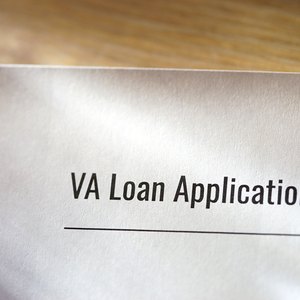
Available to military service members and veterans as well as their spouses in some situations, a Department of Veterans Affairs home loan offers some special benefits whether you're buying or refinancing. You can often avoid a down payment, get approved with more lenient credit standards and avoid private mortgage insurance. But this type of home loan comes with a VA funding fee for many borrowers along with the mortgage interest and any points you pay.
The good news is that such costs are usually tax deductible if you meet some requirements and you itemize your deductions on your tax return.
Understanding the VA Funding Fee
What sets VA loans apart from other types of home mortgages is the special VA funding fee you'll usually pay. The fee helps to offset the additional risk the VA is taking on by not making you pay PMI or put down a hefty down payment.
The VA does exclude some borrowers from the fee in situations such as when you're dealing with a service-connected disability, losing your spouse from such a disability or receiving a Purple Heart for your service. Otherwise, the VA will let you either pay the funding fee with your closing costs or spread it out through the term of your loan.
VA funding fees vary by type of loan, the number of times you've used VA loans and your down payment amount. They range from .5 percent to 3.6 percent. Your funding fee would be 2.3 percent if you bought a $200,000 first home with no down payment, or $4,600. But you'd have a 1.65 percent funding fee if you've used a VA loan before and you're putting 5 percent down on a home of the same price. You'd end up with a $190,000 loan in this case after subtracting your down payment. Your funding fee would work out to $3,135.
You can incur a significant expense, especially if you pay it all at closing.
VA Funding Fee Tax Deduction
The VA funding fee is not called PMI, but it serves a similar purpose so it's deductible as mortgage insurance on your tax return per IRS rules if you itemize your deductions. These rules apply for claiming a tax deduction as of 2021, the tax year for which you'll file a return in 2022.
- Adjusted gross income limits: There's a $50,000 (married filing separately) or $100,000 (all other filing statuses) AGI ceiling for deducting the whole VA funding fee paid. You can claim a limited deduction with an AGI of up to $54,500 (married filing separately) or $109,000 (all other filing statuses). The IRS Schedule A instructions provide a worksheet you can use to calculate the deductible portion if you fall in the latter category.
- Loan date and purpose: Your home loan must have originated on Jan. 1, 2007 or later. You must be personally liable for the loan with the property serving as collateral.
- Allocation allowed: You can deduct up to the whole amount, depending on your AGI, if your VA funding fee is part of your closing costs and you pay it all at once. Otherwise, you must deduct the portion paid annually per your loan's terms. You may have to contact your lender to get the exact amount that's tax-deductible.
Read More: Do Closing Costs Go Toward Home Purchase Prices?
Consider Other Related Deductible Costs
The VA funding fee is the primary loan fee, but that's not the only expense you can deduct that's related to your VA loan and home.
- Mortgage interest deduction: The interest portion of your mortgage payments during the tax year qualifies you for a tax deduction within certain mortgage debt limits. The deductible interest is allowed for up to a $500,000 (married filing separately) or $1 million loan (all other filing statuses) in indebtedness if you took the loan out before Dec. 16, 2017. The limits on mortgage debt drop to $375,000 (married filing separately) or $750,000 (all other filing statuses) for later loans. There's a special exception for people who are still paying loans that originated before Oct. 14, 1987. They don't have a mortgage limit at all.
- Discount point deduction: You might purchase discount points to help you get a lower interest rate and thus save money over the whole term. These points are also tax-deductible because the IRS considers them to be prepaid interest. They may be allocated over the loan's term or they can be deducted at once depending on your loan situation. VA cash-out refinance loans usually require that the allocation be taken over time, while a regular loan for a home purchase may allow for the full deduction in one tax year.
- Property tax deduction: You can also deduct as much as $5,000 (married filing separately) or $10,000 (all others) in property taxes you pay each year. This requires that you use your home as a personal residence and own it. These limits apply collectively to both your property taxes and any state and local income taxes you want to deduct. Your deduction would be limited to $10,000 even if you paid $5,000 in property taxes, $6,000 in income taxes and you're a single taxpayer, even though you've paid a total of $11,000 in taxes.
Preparing for Home Tax Deductions
You'll need some documentation to deduct your VA loan fees and other home-related costs. You can locate your mortgage interest (box 1), points (box 6) and VA funding fee (box 5) on IRS Form 1098 (the Mortgage Interest Statement) that your lender must send you unless you've paid under $600 in interest for the tax year. Your lender can provide the information if you don't receive this form or have questions about the amounts. You'll find your property taxes paid on your end-of-year mortgage statement, or you can contact your local tax assessor's office to get a copy of the year's tax payments.
Add up the deductible loan and home expenses to see what the total looks like. Consider whether you qualify for any other itemized deductions available on Schedule A. You'll then want to compare the total of your itemized deductions to the standard deduction you're entitled to claim for your filing status to see which shaves the most off your taxable income.
If you have $15,000 in itemized deductions, that's a better deal than the $12,550 standard deduction available to a single taxpayer in tax year 2021. But it's much less than the $25,100 standard deduction you could claim if you're married and filing jointly in the same tax year. Whether to move forward with taking itemized deductions will depend on your overall tax situation.
Deducting VA Loan & Home Costs
Take a look at the second and third sections of Schedule A to report deductions for the VA funding fee, mortgage interest, property taxes and points. These sections are labeled "Taxes You Paid" and "Interest You Paid." Follow these steps to proceed:
- Use line 5b to report your real estate taxes paid up to the maximum allowed.
- Use line 8a on Schedule A to report your mortgage interest plus points combined. This means adding the numbers from box 1 and box 6 on your Form 1098 and seeing the special instructions if the VA loan you took out on your home was used for more than the home purchase or improvements, such as using a VA cash-out refinance loan partly for paying off other debts. Keep the maximum loan limits in mind as well because interest over these amounts isn't deductible.
- Use line 8b and line 8c if you didn't get a 1098 form showing the interest and points you paid. Follow the same instructions as above to report these expenses.
- Use line 8d to enter the VA funding fee amount that your lender reports for the year.
You can go through the other sections and lines to claim any other itemized deductions that are available and that you qualify for after filling in this information related to your VA loan and your home. The Schedule A instructions provide further details on each line item.
Total up deductions by category at the end of each section. You'll arrive at the total amount of your itemized deductions on line 17. Transfer this final figure to line 12a on your 2021 Form 1040 tax return.
References
- USAA: VA Loan Information
- U.S. Department of Veterans Affairs: VA Funding Fee and Loan Closing Costs
- Veterans United Home Loans: Homeownership & Taxes
- IRS: Publication 936 (2021), Home Mortgage Interest Deduction
- IRS: 2021 Schedule A
- IRS: Form 1098
- IRS: 2021 Schedule A Instructions
- IRS: 2021 Form 1040
- U.S. Department of Veterans Affairs: VA Home Loan Types
- IRS: IRS Provides Tax Inflation Adjustments for Tax Year 2021
Writer Bio
Ashley Donohoe has written about business and technology topics since 2010. Having a Master of Business Administration degree, bookkeeping certification and experience running a small business and doing tax returns, she is knowledgeable about the tax issues individuals and businesses face. Other places featuring her business writing include Zacks, JobHero, LoveToKnow, Bizfluent, Chron and Study.com.

